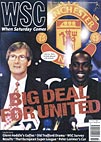 Manchester Utd may be the biggest club in the world and have the most fans, but recent talk of takeovers and turnover is causing some to forget the team's humble beginnings. Andrew Ward explains
Manchester Utd may be the biggest club in the world and have the most fans, but recent talk of takeovers and turnover is causing some to forget the team's humble beginnings. Andrew Ward explains
When news came through of Rupert Murdoch’s proposed takeover of Manchester United, who did the Sun seek out for a reaction first? Bobby Charlton maybe, or fellow Sixties legends George Best and Denis Law? How about Sir Matt Busby’s son, Sandy, or former manager and Busby Babe Wilf McGuinness? No, none of these would do, the opinion which most mattered was that of Zoe Ball.
“As a devoted fan, I’m absolutely delighted Sky is planning to buy the club,” gushed the presenter of Radio One’s breakfast show, further consolidating her position as the most clueless of United’s legion of odious celebrity supporters, which is some feat considering the competition. “It looks like it’s going to be a golden era for United. I’m really excited. It’s great for the fans because it will bring an extra sense of excitement to Old Trafford,” she said.
Even if we give Zoe the benefit of the doubt and assume that the imminent golden age she heralds refers to the acquisition of a Ronaldo or a Zidane leading to European Cup glory, rather than the increased number of televised United matches for her to watch from her sofa in London, match-going United fans would still not be entirely happy.
Ball’s comments serve as an illustration of everything that had already gone wrong with modern day Manchester United before Murdoch turned up. The mogul’s impending arrival confirms the fans’ battle to retain control of the club has been lost. Ask many of our young fans, who have never known anything but Premiership razzamatazz, to name the people they most readily associate with the club, and Fred The Red would figure higher up the list than Charlton, Best and Law. Ask them to give an example of why Manchester United are such a great club and they cite our £90 million annual revenue ahead of Wembley 1968.
It has become an accepted fact that Manchester United are the “biggest club in the world”, with a support estimated at one million and rising, because their turnover and profit dwarfs that of any club. What seems to have been forgotten is how they became such a marketable product in the first place. Brand managers had nothing to do with the 120 years of history, begun by the railwaymen of Newton Heath.
The Sun’s breathtakingly inaccurate report of the deal (“Most fans greeted the takeover enthusiastically”) gave an early indication of how Murdoch’s ownership of United is bound to distort the relationship between the club and the media. The Sun will fawn over all things red, their match reports will lose all credibility, while the non-Murdoch press will entrench against United, as they do against every other part of his business.
But it’s not tangible implications of the takeover that most worry United fans – kick-off times can hardly be changed at the whim of television schedulers any more often than they already are, and it’s hard to see how relations between supporters and the club’s administration could get any worse than they have been during the past 15 years of the Edwards regime.
Having grown up within the club, fully aware of what it meant to run Manchester United, Martin Edwards, the son of Sir Matt’s mate Louis, was someone we could accuse of betrayal. But we won’t be able to level that charge at Murdoch, because there is not the slightest suggestion that, in taking over Manchester United, he has any intention other than boosting his empire’s coffers. When football chairmen decided to take the game off free-to-air TV they effectively threw themselves on the mercy of people like Murdoch. And with the threat that clubs could go their own way – by launching TV stations to reap the millions to be made from pay-per-view – it was inevitable that Murdoch would make a move, if only to protect his interests.
United fans who worry that the club’s links with its past are being severed, that the arrival of Murdoch removes the last pretence that Manchester United now means anything, will be accused of sentimentality, and reactionary paranoia. But their critics should take a look at the new crest adorning Manchester United merchandise this season – they will notice that the words “Football” and “Club” have been spirited away.
From WSC 140 October 1998. What was happening this month